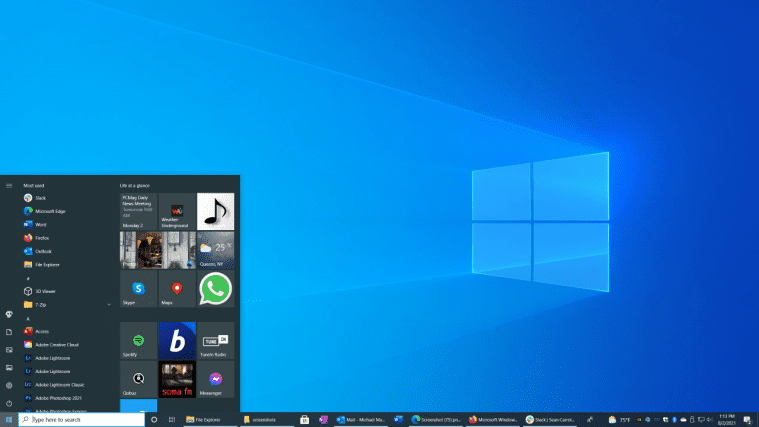Windows Insiders were treated to a build of Windows 11 in the Beta and Release Channels on Friday that only contained fixes, however we completely missed that Windows Insiders still on Windows 10 21H2 also received a new build that mostly only contains fixes as well. The new Build 19044.1499 (21H2) (KB5009596) is available through the Release Preview Channel.
This update includes the following improvements:
- We fixed an issue in Microsoft UI Automation that might cause Microsoft Outlook to stop working.
- We updated daylight saving time to start in February 2022 instead of March 2022 in Jordan.
- We fixed an issue that prevents the Windows Subsystem for Linux 2 (WSL2) localhost relay from starting when you enable Fast Startup.
- We added parameters that pass to wmic.exe in telemetry to capture additional usage data to address application compatibility concerns.
- We fixed an issue in CLSID_InternetExplorer.
- We added a reminder to Internet Explorer 11 that notifies users of its upcoming retirement.
- We fixed an issue that might sometimes cause Japanese Microsoft Office applications stop working when you use the new Japanese Input Method Editor (IME).
- We fixed an issue that causes applications to stop working when you type text using the Chinese IME.
- We fixed an issue that might cause Windows to stop working when you use the Pen Haptics API.
- We updated the phone number for Windows Activation for locales that have the wrong phone number.
- We fixed an issue that causes a device to incorrectly report itself as noncompliant with Conditional Access because of an antivirus or firewall configuration.
- We fixed an issue that stops printing or prints the wrong output when you print using USB on Windows 10, version 2004 or later.
- We fixed an issue that affects the Remote Desktop screen, in some cases, when you use Advanced Video Coding (AVC) software encoding.
- We fixed an issue that prevents certain surround sound audio from playing in Microsoft Edge.
- We fixed a deadlock in vpnike.dll and rasmans.dll.
- We fixed an issue that affects the Fast Identity Online 2.0 (FIDO2) credential provider and prevents the display of the PIN entry box.
- We fixed an issue that causes Windows to stop working and generates the error, “IRQL_NOT_LESS_OR_EQUAL”.
- We fixed an issue that might cause the Get-TPM PowerShell command to fail when it attempts to report Trusted Platform Module (TPM) information. The command fails with the error, “0x80090011 Microsoft.Tpm.Commands.TpmWmiException,Microsoft.Tpm.Commands.GetTpmCommand”.
- We fixed an issue that causes the AltGr key to stop working if a remote desktop client is running or if RemoteApp was disconnected.
- We added a new feature that provides direct access to select your Microsoft Edge profiles from News & interests. You can also go to Microsoft Edge directly from News & interests in the same corresponding profile.
- We added a new feature called Sync Your Settings for users who are migrating to Windows 11, original release. You’ll use Sync Your Settings to automatically back up a list of your applications to your Microsoft Account. Then, you can quickly restore those applications on a Windows 11, original release device. This new feature that will deploy over the coming weeks.
- We fixed an issue that causes functioning Bluetooth devices to stop working when you attempt to connect to a non-functioning Bluetooth device.
- We fixed an issue that causes lsass.exe to stop working and the device restarts. This issue occurs when you query Windows NT Directory Services (NTDS) counters after the NTDS service has stopped.
- We fixed an issue that fails to apply the Group Policy Object (GPO) “Do not allow compression on all NTFS Volume” in some cases.
- We fixed an issue that prevents Robocopy from retrying the file copy process.
- We fixed an issue that might occur when you enable verbose Active Directory Federation Services (AD FS) audit logging and an invalid parameter is logged. As result, Event 207 is logged, which indicates that a failure to write to the audit log occurred.
- Addresses a memory leak that occurs when you call WinVerifyTrust(). This issue occurs if verification fails for the first signature of a file that has multiple signatures.
This build contains no Known Issues, and as previously pointed out, no new features either. To check and see which version of Windows 10 you’re running, just type winver into the Windows search box on the Taskbar (or right click on Start and choose Run and then type in winver). It should show as “Version 21H2”.

